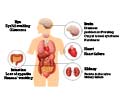Elevated amyloid levels may represent earliest stage of Alzheimer’s disease and appropriate anti-amyloid measures at this stage may prevent the symptomatic phase.
- Therapies in the symptomatic dementia stage of Alzheimer’s disease are not very satisfactory or effective
- Current study suggests anti-amyloid measures should begin in the pre-clinical phase of Alzheimer’s disease to retard or stop the progression of the disease to the symptomatic phase
Early Stage of Alzheimer’s Disease – Case For Anti-amyloid Therapy
The authors of the study reiterate that Alzheimer’s disease actually begins long before the symptoms become clinically apparent. The preclinical phase of increased amyloid levels is the earliest warning sign of Alzheimer’s disease, and is considered the incubation period for the disease. Interestingly, this phase often lasts longer than the clinical phase of symptomatic AD."We've learned that intervening before the heart attack is a much more powerful approach to treating the problem," Donohue said.
Aisen, Donohue and others hope that removing amyloid at the pre-clinical stage will slow down or retard the onset of Alzheimer's or even stop it.
Association Between Amyloid And Cognitive Decline – The Study
The current study uses 10 years of data from the Alzheimer's Disease Neuroimaging Initiative, an exploration of the biomarkers that presage Alzheimer's. USC ATRI is the coordinating center of this North American investigation. Aisen co-directs its clinical core. The findings of the study were published in The Journal of the American Medical Association. The details of the study are given below.- Amyloid levels were measured by the research team in 445 cognitively normal people in the United States and Canada by positron emission tomography (PET) scans or cerebrospinal fluid analysis.
- 242 showed normal amyloid levels and 202 had increased amyloid levels.
- The participants, all of whom underwent cognitive tests, had an average age of 74.
- The follow-up period lasted 10 years, however each participant, on average, was observed for three years. The maximum follow-up was 10 years.
- The group that had increased amyloid levels was older and less educated. Also, a significant proportion of this group carried at least one copy of the ApoE4 gene, which increases the risk of developing Alzheimer's.
- At the four year mark, global cognition scores were measured; 32 percent of people with raised amyloid levels had developed symptoms consistent with the early stage of Alzheimer's disease. However, only 15 percent of participants with normal amyloid levels showed a significant decline in cognition.
- A smaller sample size was analyzed at 10 years. The team noted that 88 percent of persons with elevated amyloid levels show significant mental decline based on global cognitive tests. In comparison, only 29 percent of people with normal amyloid showed cognitive decline.
"We need more studies looking at people before they have Alzheimer's symptoms," Aisen said. "The reason many promising drug treatments have failed to date is because they intervened at the end-stage of the disease when it's too late. The time to intervene is when the brain is still functioning well -- when people are asymptomatic."
About Amyloid Protein
Amyloid is an abnormal protein with distinctive physical properties which cause them to aggregate together forming insoluble fibrils resistant to degradation. These abnormal proteins get deposited in various tissues leading to disease.When amyloid proteins aggregate and accumulate in the brain, the risk of developing Alzheimer’s disease is increased. One out of every third person shows increased amyloid in the brain. Studies suggest that individuals with elevated amyloid in their brains will progress to symptomatic AD within 10 years.
Global Alzheimer’s Research
- The USC-ATRI scientists have developed a set of cognitive tests called the Pre-clinical Alzheimer Cognitive Composite which are now being widely employed to diagnose AD before the onset of dementia. Until recently the diagnosis of AD was made only after death by studying the brain tissue under a microscope.
- Several drugs are being developed for testing in the early or pre-clinical phase of AD. In fact, USC has been actively involved, and has even led he only two anti-amyloid studies that focused on the early, pre-clinical stage of sporadic Alzheimer's: The Anti-Amyloid Treatment in Asymptomatic Alzheimer's study (the A4 Study) and the EARLY Trial.
- Amyloid fibrils - (https://www.ncbi.nlm.nih.gov/pmc/articles/PMC2634529/)
- Alzheimer’s Disease and the β-Amyloid Peptide - (https://www.ncbi.nlm.nih.gov/pmc/articles/PMC2813509/)















